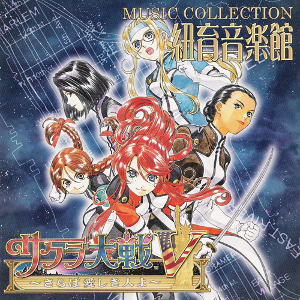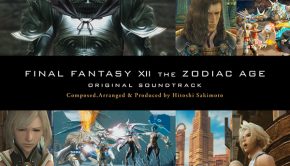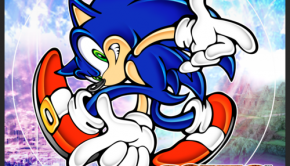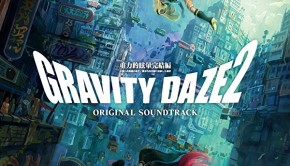Sakura Wars V Music Collection
 |
Album Title: Sakura Wars V -So Long, My Love- Music Collection New York Music Hall |
| Record Label: Avex |
|
| Catalog No.: AVCA-22380/1 |
|
| Release Date: September 7, 2005 |
|
| Purchase: Buy Used Copy |
Overview
The Sakura Wars (Sakura Taisen) series began in an alternate reality Taisho era Japan, and moved to Europe with Sakura Taisen 3. In Sakura Taisen 4, the teams from the first three games were combined and everyone was reunited one last time. Then after 2002, the series lay mostly dormant for a few of years. Aside from the stage shows, anime productions, and side games, in the interim there were no new main series Sakura Taisen games until 2005’s Sakura Taisen V came out. This title brought the series (with a new commander in place of the previous games’ Ogami) to the New World, starting with a prologue and culminating in this game, Sakura Taisen V: So Long, My Love. Matching this new setting, the music had to change in style and tone as well.
Body
In 1920s America, the popular music styles were Jazz and Big band. Ragtime had diminished in popularity after the 1910s, swing wouldn’t come into its own until the 30s, and Rock and Roll was still decades away. In the early part of the 20th century, American popular music was just coming into its own as a separate entity from sheet music of ragtime pieces and Steven Foster songs. Jazz and Big band were flourishing, and records and radio supported this lively musical culture. Sakura Taisen V: So Long, My Love, set in this environment, integrates these styles with Tanaka’s style of action material and song-like melodies.
The soundtrack begins with a new theme, “Chijo no Senshitachi,” to replace Gekitei from the earlier games. The style is similar, but the instrumentation leans more towards Big band, with saxophones and brass at the forefront. The lyrics, as always by series creator Ohji Hiroi, are as cheesy as ever, and the music is in the usual heroic vein. It’s still quite enjoyable, though, and the singers do a good job as always. The theme turns up a few more times in the soundtrack in various instrumental guises. After the opening and an instrumental version comes a jazzy piece, “Little Lip Theater,” bringing in the Big band style that dominates the next part of the soundtrack. Somewhat reminiscent of a Broadway number in its song-like melody and upbeat feel (although 20s Jazz and Big band developed into that style and not the other way around). The next two tracks, “Coffee Break” and “Neon Lit Town” are more laid-back, with smaller Jazz ensembles. Light pizzicato string bass lines and piano dominate.
Like the prologue game, Episode 0: Samurai Girl of the Wild West, So Long My Love does not feature the live orchestra performances that helped Sakura Taisen 4‘s soundtrack. Tanaka is a very good orchestrator, and the synth used here and in Episode 0 doesn’t display his talents as well as it could. The tracks focusing on orchestra here tend to sound like a dull wash (partially because the instrument doublings dilute the character of each more in synth than they would in live performance) when they should be more exciting. The synthesized Big band tracks, on the other hand, sound pretty good, and the saxophones, clarinets, and horns sound great, retaining their individual characteristics much more than the stings and piano in the orchestral tracks.
The soundtrack feels at its most fresh and alive when it focuses on these styles, though, as its orchestral pieces are generally much blander. When “Excited,” with its constant string and electric guitar ostinati, appears, it just sounds like generic Tanaka action music. With the aforementioned synth issues,this track along with pieces like “Sword Flash,” “State of Emergency,” and “Assault” just becomes dull after a bit. Still, “The Destroyed and the Undestroyed” is a good track, juxtaposing sampled choir with synth choir and disquieting ostinati. There are a number of more upbeat orchestral pieces as well, such as the march-flavored “Ahab, Take Off!” and the soaring “Those Fighting on the Flight Deck,” and these fare better than the other action music. Still, one wishes for a bit more from them as well.
The series’ trademark Japanese elements don’t show up until the end of disc 1, but they continue on to the beginning of disc 2 as well. In “Gang of Destruction,” a Shamisen and an electric guitar take the lead, and it’s a great combination. Backed up by an insistent drum backbeat, and featuring an electric organ, it’s really over the top, but really enjoyable as well. A series of tracks on the second disc, numbers 11-16, are instrumental versions of songs that represent the various characters, and each of these has its own flavor. They are pretty short, though, and aren’t looped.
After the soundtrack proper come a series of various stings and incidental pieces used during cutscenes, some of them versions of pieces in full form elsewhere. For the most part, they are good enough, but generally insubstantial (all under 2 minutes and most under 1), and few would miss them if they were gone. At the very end, as a bonus track, the entire cast comes together for “Over the Rainbow Sunshine.” It’s a somewhat jazzy song, and benefits from the live instrumentation, featuring Jazz band and strings, as well as the good performances by the cast, who all get a chance to sing lines individually in addition to the harmonies on the chorus. Sometimes the thick strings dip the track into muzak territory, and either the lyrics or melody may come off as too saccharine, but it doesn’t overstay its welcome despite its 6 minute length. Fittingly, it ends on a slightly sentimental add6 chord.
Summary
As the only Sakura Wars game to have made it to the West, Sakura Taisen V: So Long my Love had to act as its series’ sole representative to non-Japanese audiences, and it had the series’ reputation to live up to. Game publications in the West responded favorably, but as it has been a decade since the last main series Sakura Wars game came out, it may be a while before it is revived. The game’s soundtrack has a few great moments, and is competent throughout, but a swath of uninspired orchestral tracks and some synth problems hold it back from better things.
Do you agree with the review and score? Let us know in the comments below!
3.5
Posted on July 9, 2015 by Ben Schweitzer. Last modified on January 19, 2016.














